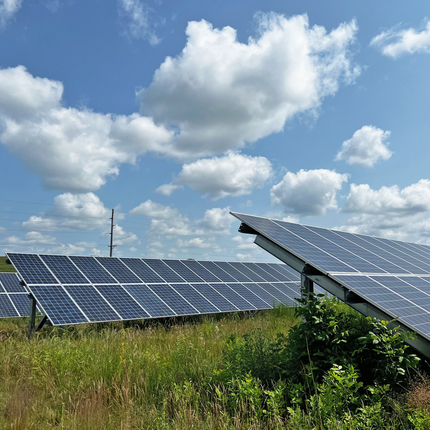Growing crops, raising livestock under solar panels could be ‘best of both worlds’
November 1st, 2024 by Ric Hanson
(Radio Iowa) – Creating a field of solar panels to generate power doesn’t have to mean taking farmland out of agricultural production. Mallory Tope, a policy associate with the Center for Rural Affairs, says “dual use solar” is an excellent solution for meeting the growing demand for renewable energy while also utilizing Iowa’s fertile soil for growing crops — and growing other things. “A dual use solar site combines solar generation with agricultural use,” Tope says. “There’s a lot of different options. You could do livestock grazing, crop production, pollinator habitat, beekeeping, but it really just is the essence of using the same land to have ag and solar generation.”
The center is launching an educational campaign designed to reach policymakers at the city, county and state level. “There’s a lot of concern around having solar on agricultural land and taking that land out of production, but with dual use, you’re able to get both and have all the benefits that come with having a solar site,” Tope says. “You get the tax revenues, the landowners get their lease payment, but you still get to use that land for agricultural production.” The Center for Rural Affairs is working to encourage local leaders to consider agri-solar and dual use when drafting or amending ordinances that relate to solar development.

CFRA photo
“It’s a great solution, as a lot of people maybe don’t want to completely take out land for just solar, but with agri-solar, you still can get some use out of it,” Tope says. “It’s kind of like the best of both worlds, having that energy generation and being able to still use your land for some agricultural usage.” To support dual use development, Tope says counties could set additional land-use expectations, adopt zoning approaches that allow for mixed land use, or set up overlay districts for special solar permits.
A report from the Clean Grid Alliance says Iowa has more than 30-million acres of farmland, with about 18-million considered “prime” acres, while about 25-hundred acres statewide are devoted to solar, generating 260-megawatts of power.





